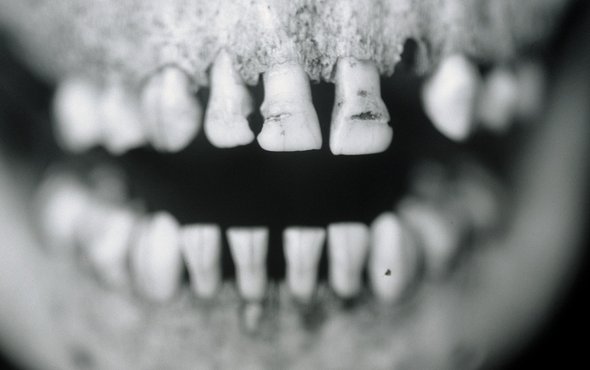(单词翻译:单击)
听力文本
This is Scientific American — 60-Second Science. I'm Christopher Intagliata.
We have pretty good dental hygiene today—regular brushing, flossing, dental visits. But thousands of years ago? Not so much. Which means the old-timers' teeth had a lot of plaque. And today that ancient tartar is a gold mine for archaeologists.
"What that's doing is basically entombing all this kind of biomolecular information that comes from your mouth." Jessica Hendy, an archaeological scientist with the Max Planck Institute in Germany.
Hendy and her team used dental scrapers—just like your dentist uses—to remove tartar from human teeth found in Great Britain, dating from the the eighth century B.C. ...the Iron Age...all the way to the 1800s. With some modern samples thrown in, as a metric. They extracted proteins from the dental scrapings, then used mass spectrometry to reconstruct the menu.

Across the ages were the remains of dairy products. "As well as milk we found evidence of cereal, specifically oats, and evidence of peas, and also evidence of something in the cabbage family." The full bill of fare is in the Proceedings of the Royal Society B.
The study shows that probing proteins in tartar can help figure out ancient diets—especially for foods that themselves don't preserve well. And though good oral hygiene is extremely important..., if you forget to floss tonight, future archaeologists may thank you.
Thanks for listening for Scientific American — 60-Second Science. I'm Christopher Intagliata.
参考译文
这里是科学美国人——60秒科学。我是克里斯托弗·因塔利亚塔。
现在我们有良好的口腔卫生——定期刷牙、用牙线、看牙医。但在几千年以前呢?口腔卫生可不太好。这意味着古代人的牙齿上有大量牙菌斑。而现在,古代人的牙石对考古学家来说就是“金矿”。
“基本上来说,牙石的作用就是把你口中所有的生物分子信息埋起来。”德国马克斯·普朗克研究所的考古学家杰西卡·亨迪说到。
亨迪和团队用你的牙医使用的那种刮牙器,去除从英国发现的人类牙齿上的牙石,这些牙齿的年代从公元前8世纪的铁器时代一直到19世纪。这些牙齿中掺进了一些作为衡量标准的现代样本。他们从牙齿碎屑中提取了蛋白质,然后用质谱法重建菜单。
经过漫长岁月留下的是奶制品的残余。“除奶制品外,我们还发现了谷物的证据,特别是燕麦,另外还有豌豆和甘蓝类蔬菜的证据。”完整的菜单刊登在《英国皇家协会学报》上。
研究表明,探究牙菌斑中的蛋白质可以帮助我们了解古代饮食,特别是那些无法完好保存的食物。尽管良好的口腔卫生极为重要,但如果你今晚忘了用牙线,那未来的考古学家可能会感谢你。
谢谢大家收听科学美国人——60秒科学。我是克里斯托弗·因塔利亚塔。
译文为可可英语翻译,未经授权请勿转载!
重点讲解
重点讲解:
1. come from 始于;产自;来自;
This poem comes from his new book.
这首诗出自他的新书。
2. as well as 除…之外;也;还;
They sell books as well as newspapers.
他们既卖报也卖书。
3. figure out 想出;理解;弄清;
I can't figure out the implications of what he said.
我揣摩不透他那番话的意味所在。
4. forget to do sth. 忘记;忘了(做);
Don't forget to take your camera.
别忘了带上相机。


